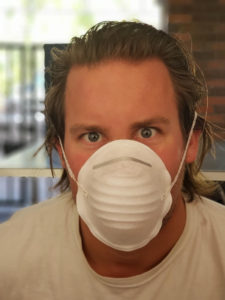
Like everyone else on the front lines during these bizarre times, we all go through daily scares and tensions, but it’s a bit of a different ballgame when you’re dealing with mental illness. Most of our patients are clinically paranoid, delusional, depressed, suicidal, hostile, etc. as it is, but COVID-19 has been heightening these for them to an exponential level.
We go through a rigorous screening process before deciding to admit someone, but a lot of the clients are unable to give accurate accounts regarding their history, due to their conditions, and sometimes it’s next to impossible to get corroborated feedback from their loved ones, as they’ve been homeless and estranged from them for so long, so we never fully know what we’re getting until we see them facemask to facemask.
And once we’ve jumped through all the hoops of admitting someone, the fun has just begun. Our programs are primarily geared towards intensive outpatient treatment, in which the patients live in various state-licensed residential housing facilities in the community while under our care, and are usually transported to the main centers during normal business hours to have individualized sessions with their counselors, therapists, providers, etc., as well as to engage in group therapy with their peers. They are also regularly taken on experiential therapy outings in nature as part of their overall treatment plan; however, during sheltering-in-place, we’ve begun conducting all of their healthcare-related appointments with the above-mentioned people via telemed, and as such, the patients have started getting overly frustrated and stir-crazy, and are deteriorating much quicker than normal. Due to these circumstances, among others, a number of them have recently left against medical advice, some very unexpectedly.
A young gentleman of note had been in our program for a few months and was doing very well, but a couple of weeks ago in the midst of the escalating coronavirus hysteria, we saw him heading towards the front door with all his bags packed and a disturbed look in his eyes, and when we asked him what he was doing, he said, “The voices in my head telling me to run has become too overwhelming, and I’m afraid there’s nothing you can do to get me to stay.”
Needless to say, it’s extremely hard seeing them walk out the door after we’ve done everything we can do to try and get them to continue their treatment with us or transfer them to another facility, especially since some of them are gravely disabled and can’t fully provide for their basic needs.
Hearing about prior clients overdosing and dying, and/or committing suicide shortly after leaving our programs are, sadly and soberingly—not very uncommon; but it’s especially hard now seeing them go out into an ever more inscrutable and daunting world.
And it’s not just the clients that are experiencing tragedy. Many of the healthcare workers in the alcohol and drug addiction/mental health treatment industry are in recovery themselves, myself included, and since a lot of treatment centers are closing down due to not being able to sustain their census, a lot of the employees are losing hope and have resorted to relapsing. I personally know a number of people in the field who have died recently due to such events.
When I asked one of my friends in this category the other day why he’s not interested in going back to treatment, he said, “What’s the point? Just kill me now.”
Besides the clients and employees in my industry, what’s also heartbreaking are the people who need help and aren’t getting it, because of lockdown, and everything that goes with it. They’re scared to leave their homes and go to treatment, and 12-step fellowship meetings and the like are now all online, which makes it increasingly difficult for people to fully get the support necessary to cope with and overcome their afflictions.
Luckily, I am still employed (for now), and although things seem grim, people do indeed recover everyday all over the world and go on to help others, so as someone who’s been through the gauntlet in more ways than one, I will continue to try and be a beacon of hope however I can for the people who need help finding a way out of the darkness during this long, strange trip we’re all on.
Charles J. March III is a hospital corpsman veteran currently living in California and working in the detox nursing field. He has recently read One Hundred Years of Solitude and Tropic of Cancer, and is currently reading Dali, by Christopher Masters. One of his all-time favorites is A Confederacy of Dunces. More can be found on his LinkedIn & SoundCloud accounts.
A PORTFOLIO OF WRITING BY NURSES: TABLE OF CONTENTS • Tina Carlson • KD Seluja • Sally Helmi • Christine Riley • Jane Slemon • Renata Bubadué • Diane Kraynak • Geraldine Gorman • Charles March III • Mary Ann Thomas • Sarah Comey Cluff • Brenda Beardsley • Shirley Stephenson • Nicole Aicher • Amanda Reilly • Angela Todd • D. Liebhart
In 2021, well into the Covid pandemic, The Other Editors of Fence, Sarah Falkner and Jason Zuzga, issued "A Call for Writing by Practicing Nurses" that circulated widely, the text of which you can read here.
In Issue #39 and here online, we include the resulting portfolio of essays, poetry, and witness across the nursing specialties. The work offers us hard-fought wisdom, raw emotion, beauty, and no easy answers. This is a Covid-era Fence space of encounter between the art of nursing and the art of literature, for literary writers and nurses to meet, learn from each other, and cross-pollinate through words.
You can read an introduction to the work by Sarah Falkner, here.
